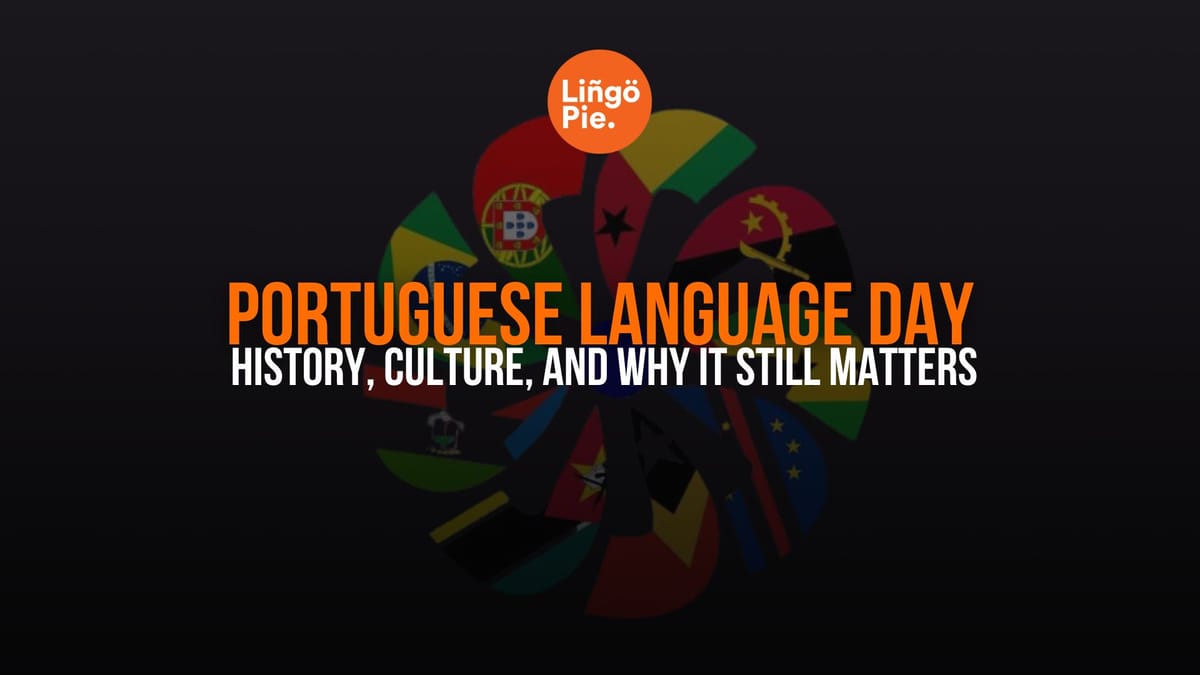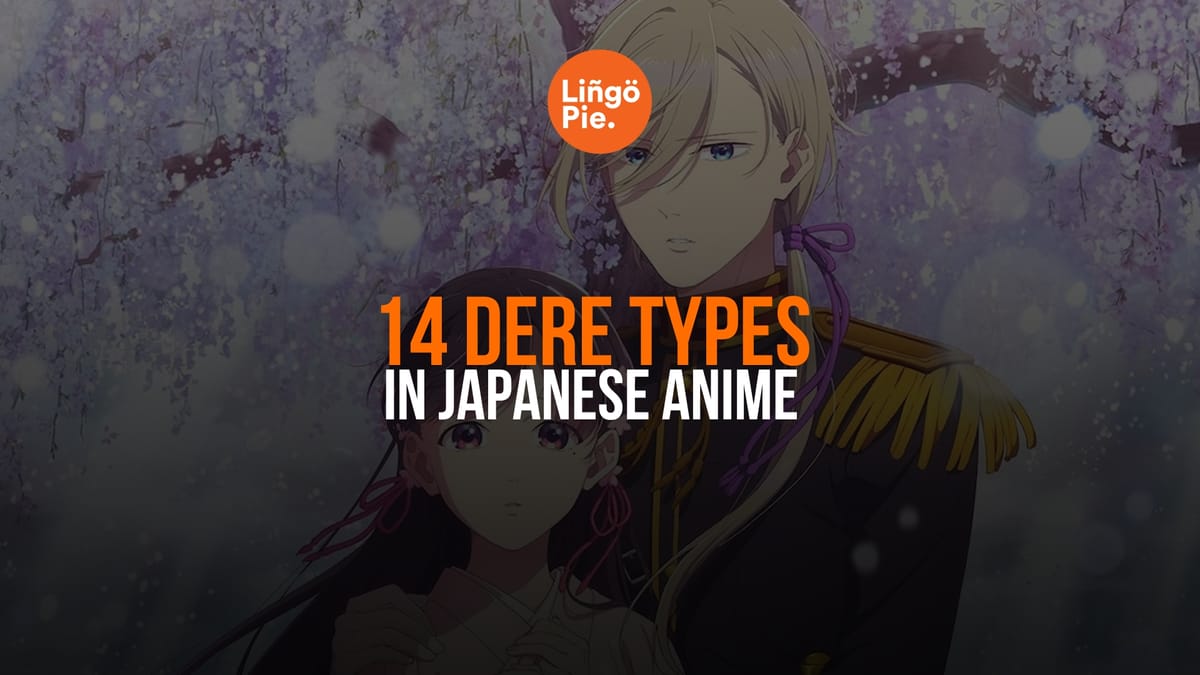Have you ever stumbled across a Portuguese show on Netflix — maybe Brazilian, maybe European — and thought, “I wish I could actually understand what they’re saying”? You’re not alone. Portuguese is one of the fastest-growing global languages, and it's spoken by nearly 300 million people worldwide, according to UNESCO. It’s also the most spoken language in the Southern Hemisphere, connecting cultures across South America, Africa, Europe, and even parts of Asia.
Whether you’re into music, travel, or just want to dive into a new language through films and shows, there’s never been a better time to learn Portuguese — especially during World Portuguese Language Day. And the best part? You can do it while binging on content you love. Start learning Portuguese with Lingopie and immerse yourself in the real, everyday language spoken across the Lusophone world.
How To Learn Portuguese Fast? [Best 2025 Guide]
Hello In Brazilian Portuguese: 13+ Easy Greetings To Use
6 Best Portuguese Comedy Movies Everyone Should Watch

Why is World Portuguese Language Day a Big Deal?
Well, for starters, it's a day to celebrate a language that's a major player on the global stage. It's about recognizing its importance in international communication and its massive geographic reach. It's also a nod to the rich cultures and shared identity of the peoples who speak it. Essentially, it's a worldwide party for the Portuguese language and everything that comes with it!
When Do We Celebrate World Portuguese Language Day?
The date we mark on our calendars is May 5th.
The Community of Portuguese-speaking Countries (CPLP) officially established May 5th in 2009 to celebrate the Portuguese language and Lusophone cultures. Later, in 2019, UNESCO's General Conference proclaimed May 5th of each year as "World Portuguese Language Day". The first time UNESCO officially celebrated this day was in 2020.
What is the CPLP and Why is it Important?
The CPLP stands for the Community of Portuguese-speaking Countries.
It's an intergovernmental organization that unites peoples who share the Portuguese language as a core part of their identity. The CPLP has been in official partnership with UNESCO since 2000 and was key in establishing May 5th as the day to celebrate the language. They work together with entities like UNESCO and Camões, I.P. on commemorative events for the day.
Portuguese: A Language Spoken Around the World
Get this: Portuguese isn't just spoken in Portugal and Brazil! It's spoken by nearly 300 million people across four continents. Sources also state over 265 million speakers spread through all continents. It's officially the most spoken language in the Southern Hemisphere. It's characterized by its incredible diversity and welcoming nature.
Portuguese is considered a major language of international communication and one that's set to grow even more globally. Languages like Portuguese that are used for global communication are super important for building understanding, respect, and getting along with people from all sorts of backgrounds.
More Than Just Words: Portuguese, Culture, and Identity

Portuguese is a powerhouse for connecting people and cultures. It fosters dialogue, tolerance, and celebrates diversity. Think of it as a bridge between different ways of seeing the world!
Culture is highlighted as a powerful tool for peace, helping to combat misunderstanding, ignorance, intolerance, and prejudice. The Lusophone (Portuguese-speaking) world is home to vast cultural diversity and complex societies. Because the language spreads across such a varied network, it's a really important way for people to talk to each other and understand one another.
You know those amazing cultural traditions that make countries unique? Many are passed down through Portuguese! Manifestations like Semba, Capoeira, Fado, and Morna, plus countless musical, gastronomic, dance, and visual elements, carry the history of many different peoples. These are shared across generations through oral traditions, books, and technology.
The language also plays a big role in preserving history and identity through things like the press, archives, and libraries. The Memory of the World program, which has 21 records from Portuguese-speaking countries, helps manage, conserve, and share these historical collections internationally.
And let's not forget the amazing writers! The Portuguese language reveals our common humanity through its immense body of literature. This includes folks like José Saramago, the first Portuguese-speaking Nobel Prize winner in Literature, Olinda Beja, Luís Cardoso, and the recently passed Nélida Piñón. Portuguese literature also reflects the complexities of shared history, including dark chapters like colonization and slavery, promoting mutual respect. Writers like Abdias do Nascimento, a key figure in the Brazilian anti-racist movement and winner of the UNESCO-Toussaint Louverture Prize, have conveyed powerful messages of peace through the language.
The creative economies in Portuguese-speaking countries are bubbling with activity. Efforts from countries like Brazil contribute to the International Fund for Cultural Diversity, putting the Lusophone world in a special place regarding the Convention on Cultural Diversity. This shows how fertile the language is for cultural productions across the ocean. UNESCO's creative cities network also helps boost local cultural management.
Callout Card: Did you know Portuguese-speaking countries collectively contribute to the list of World Heritage sites? They have a total of 43 elements on the list! That's a lot of history and beauty connected by one language!
Portuguese in Science and Knowledge

Portuguese isn't just for poetry and song (though it's great for that!). It's also a powerhouse in producing knowledge and educating citizens.
When it mixes and interacts with other languages, including native and indigenous ones in Portuguese-speaking countries, it helps millions of kids learn around the world. In higher education, 43 UNITWIN/UNESCO Chairs and Networks in CPLP countries are making their mark internationally. The language's role as a working language and the exchange among teachers help spread knowledge and build scientific collaboration networks.
Portuguese originated as an Atlantic language and reached the Indian and Pacific oceans centuries ago, leading to research spread across the globe. It's estimated to be the sixth most used language for publications in natural and exact sciences and the fifth in social sciences. It helps expand global science, making scientific knowledge and its results more accessible to citizens.
The biodiversity in Portuguese-speaking areas is huge, leading to lots of international scientific cooperation focused on sustainable development. Research published in Portuguese brings new academic traditions and perspectives on development and biodiversity to global science.
And in today's digital world? Portuguese has a strong presence on the internet, with tons of knowledge being created in the language. It helps connect creators and consumers of digital content, supported by better tools and algorithms. The relevance of Portuguese online is both about the amount of content and its quality.
Portuguese and the Push for Peace (Thanks, UNESCO!)
UNESCO, which was created after World War II, is all about building peace in people's minds through spreading knowledge and understanding among different groups. Since communication is key to diplomacy, UNESCO is like the ultimate example of this, building agreement through talks and debates to manage differences and build peace.
The CPLP works to make sure Portuguese, being the most spoken language in the Southern Hemisphere, is properly represented at UNESCO. Portuguese is one of the official languages of UNESCO's General Conference and is used in all parts of the organization.
The commitment to defending peace through education, communication, science, and culture is being built in people's minds in the Portuguese language. Portuguese-speaking countries and institutions, including Brazil, are dedicated to working with UNESCO to promote the value of the language. Spreading Portuguese is seen as spreading UNESCO's ideas and a culture of peace.
UNESCO has also collaborated on specific initiatives, like the Lúcio Costa center in Rio de Janeiro, Brazil, which was set up by UNESCO to connect countries in Latin America and the CPLP regarding heritage. And the efforts mentioned earlier regarding the International Fund for Cultural Diversity also highlight the collaboration between Portuguese-speaking countries and UNESCO.
Callout Card: Audrey Azoulay, the Director-General of UNESCO, has highlighted Portuguese as a language known for its creativity and its contribution to a culture of peace. António Guterres, the UN Secretary-General, called the proclamation of World Portuguese Language Day a fair recognition of the language's "global relevance" and an "affirmation of diversity".
How Can I Start My Portuguese Language Journey?
Feeling inspired by all the cool things happening in the Portuguese-speaking world? Awesome! Learning Portuguese can be incredibly rewarding. You could soon be understanding those captivating Brazilian films, singing along to Fado without needing subtitles, or even planning a trip to one of those 43 World Heritage sites!
Forget dry textbooks! The best way to learn is by doing things you love. Just like you'd binge-watch a K-drama or try ordering tacos in Mexico [External Link Placeholder: Example: How to order tacos like a pro - Not from sources], you can learn Portuguese by watching amazing shows and movies!
Ready to dive in?
Wrapping Up Our Portuguese Party!
So there you have it! World Portuguese Language Day on May 5th is a fantastic reminder of just how significant and vibrant this language is. From being the most spoken language in the Southern Hemisphere to its crucial role in global communication, culture, science, and building peace alongside organizations like UNESCO, Portuguese is truly a language of the future.
It connects incredible people, fosters diversity, and carries a rich history across continents. Celebrating this day is about celebrating the power of language to bring us together!
Why not make celebrating this year mean taking the first step (or the next step!) in learning Portuguese?
FAQs About World Portuguese Language Day
What country speaks 70% Portuguese?
Brazil! Over 70% of Portuguese speakers live in Brazil, which makes it the largest Portuguese-speaking country in the world by far.
Why are Portuguese days different?
Portugal and Brazil observe different cultural and historical holidays. While both speak Portuguese, their colonial histories shaped unique traditions.
Why is Language Day celebrated?
Language Days, like Portuguese Language Day, highlight linguistic diversity and promote cultural understanding across nations and communities.
Why is Brazil's national language Portuguese?
Brazil was colonized by Portugal in the 1500s. Portuguese became the official language and remained dominant even after Brazil's independence in 1822.
What is the top 10 most spoken language in the world?
According to Ethnologue, the top 10 languages by number of speakers include English, Mandarin, Hindi, Spanish, French, Arabic, Bengali, Russian, Portuguese, and Urdu.







![How To Learn Portuguese Fast? [Best 2025 Guide]](/blog/content/images/size/w300/2024/08/Lingopie-2.png)

